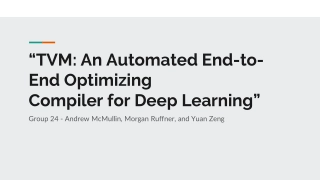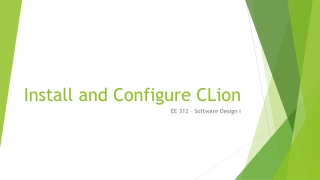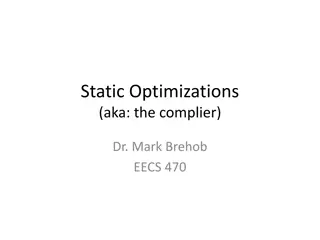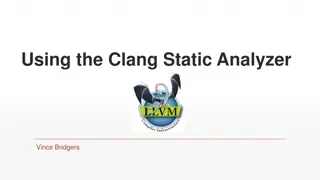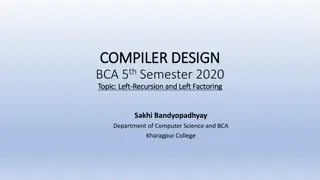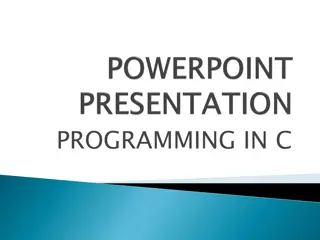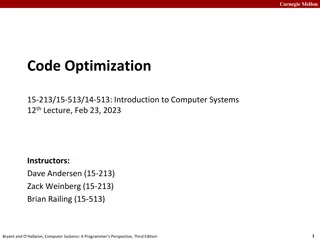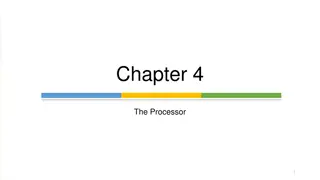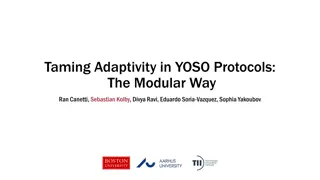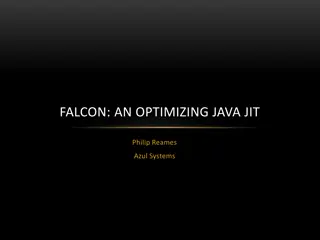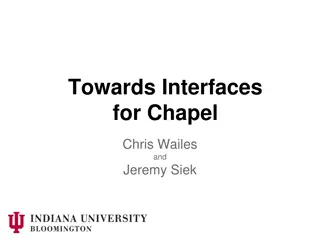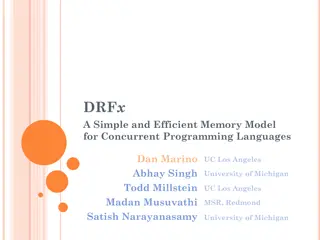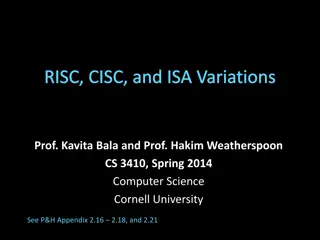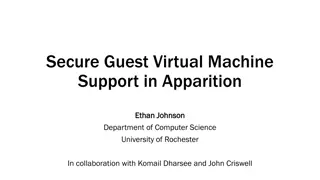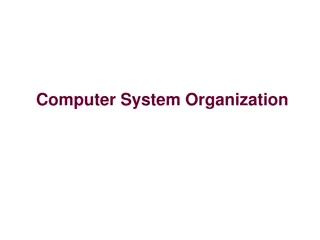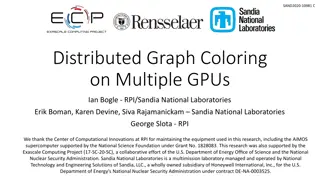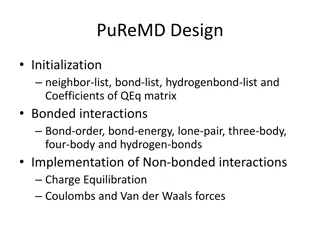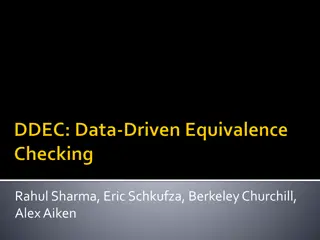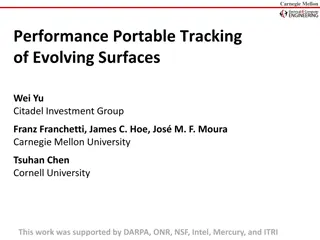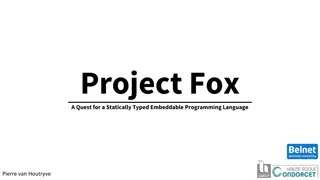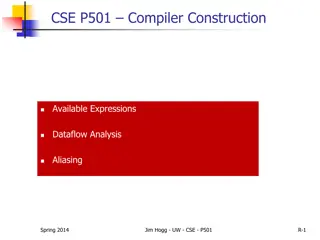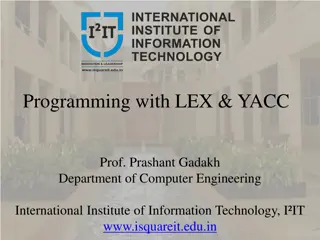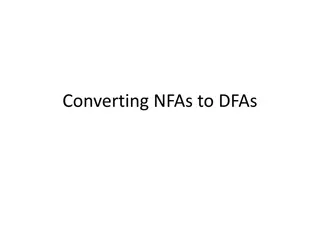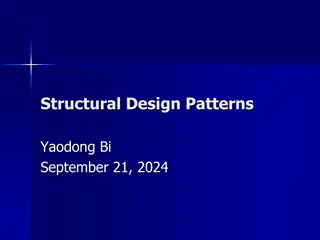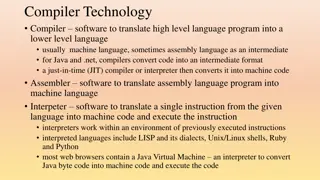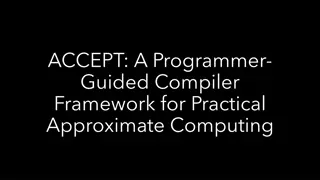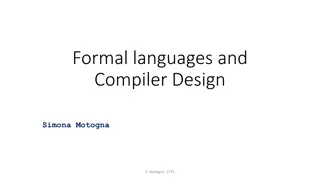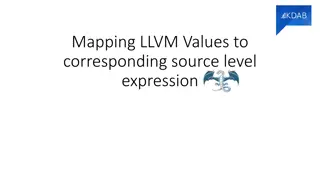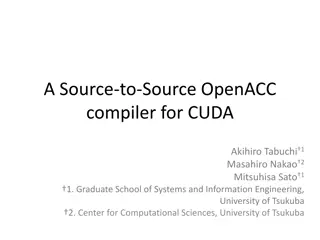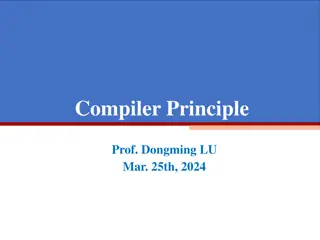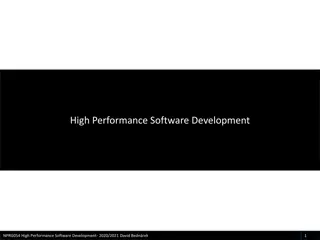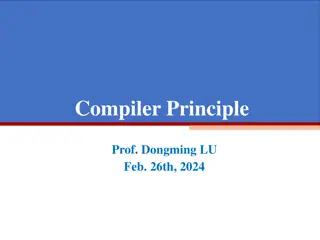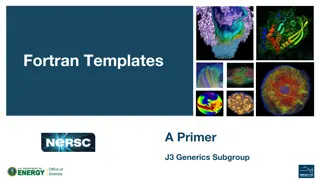TVM: An Automated End-to-End Optimizing Compiler for Deep Learning
TVM is a compiler that generates optimized code for diverse hardware back-ends from high-level specifications of deep learning programs, addressing the challenges of diverse hardware characteristics.
6 views • 16 slides
Install and Configure CLion
Learn how to set up CLion IDE and MinGW compiler for Windows to start developing software. Follow step-by-step instructions to download, install, and configure both tools efficiently, enabling you to begin coding in no time.
1 views • 10 slides
Static Optimizations
Explore the fundamental concepts of static optimizations in hardware architecture, focusing on compiler-driven techniques to improve performance and efficiency. Learn how compilers can enhance data locality, reduce unnecessary instructions, and minimize branches executed. Discover strategies such as
0 views • 42 slides
Understanding Memory Ordering in Programming
Memory ordering in programming is crucial for developers to understand, as it dictates the sequence of memory operations at different levels - source code, program order, and execution order. Compiler optimizations and reordering of memory accesses can impact how code is executed by the processor, e
1 views • 30 slides
Understanding the Compilation Toolchain in Software Development
Delve into the world of the Compilation Toolchain, from pre-processing to dynamic linking and loading. Explore the functionalities of the preprocessor, compiler, and include guards in C programming. Discover the significance of header files, #define directives, and preprocessor macros in converting
0 views • 40 slides
Understanding the Clang Static Analyzer by Vince Bridgers
Explore the benefits of tools like Static Analysis, discover different types of program analysis such as linting checks and Compiler diagnostics, and learn about finding flaws in source code through symbolic and dynamic analysis approaches. The tutorial covers the importance of early bug detection,
1 views • 34 slides
Understanding Left Recursion and Left Factoring in Compiler Design
Left recursion and left factoring are key concepts in compiler design to optimize parsing. Left recursion can be problematic for top-down parsers and needs to be eliminated using specific techniques. Left factoring is a method to resolve ambiguity in grammars with common prefixes, making them suitab
0 views • 15 slides
Exploring Contiki and Contiki-NG: A Comprehensive Overview
Contiki and Contiki-NG are wireless sensor network platforms offering software and hardware solutions. Contiki uses the Protothread-based operating system, while Contiki-NG utilizes a component-driven C programming model. The development process involves static modules in ROM, with user programs loa
0 views • 23 slides
Introduction to Programming in C Language
C language is a procedural programming language developed by Dennis Ritchie in 1972. Known for its low-level access to memory, simple keyword set, and clean style, C is ideal for system programming tasks like operating system and compiler development. This article covers key aspects of C language, P
0 views • 12 slides
Evolution of Compiler Optimization Techniques at Carnegie Mellon
Explore the rich history of compiler optimization techniques at Carnegie Mellon University, from the early days of machine code programming to the development of high-level languages like FORTRAN. Learn about key figures such as Grace Hopper, John Backus, and Fran Allen who revolutionized the field
0 views • 49 slides
Understanding Processor Speculation and Optimization
Dive into the world of processor speculation techniques and optimizations, including compiler and hardware support for speculative execution. Explore how speculation can enhance performance by guessing instruction outcomes and rolling back if needed. Learn about static and dynamic speculation, handl
0 views • 33 slides
Shader Fundamentals: Compiler Control and Global Options
Understanding how shaders are compiled with optimization control using pragma directives, managing shader processing in extension blocks, organizing shader variables into blocks, specifying uniform blocks, and controlling layout with qualifiers.
0 views • 20 slides
Taming Adaptivity in YOSO Protocols: The Modular Way
Explore the concept of taming adaptivity in YOSO protocols through a modular approach. The research delves into the efficiency, adversary adaptivity, role assignments, and compiler models in synchronous YOSO protocols. The visual presentations illustrate the framework, challenges, and strategies in
0 views • 19 slides
Falcon: An Optimizing Java JIT Compiler Overview
Explore Falcon, an LLVM-based just-in-time compiler for Java bytecode developed by Azul Systems. Learn why using LLVM to build a JIT compiler is beneficial, address common objections, and dive into the technical and process lessons learned through its development timeline.
0 views • 66 slides
Effective Countermeasures Against Cyber Attacks
Explore various defense mechanisms to prevent cyber attacks, including proper bounds checking, system defenses like NX bit, Canaries, ASLR, DEP, and techniques like ROP chains. Learn about compiler-level techniques such as inserting canaries on the stack to detect overflows and separating executable
0 views • 23 slides
Enhancing Chapel Compiler with Interfaces and Semantic Changes
Explore the evolution of Chapel compiler with the integration of interfaces, semantic modifications, and improvements in error messages. Delve into the concepts of constrained generics, function call hijacking prevention, and the impact on compiler efficiency.
0 views • 30 slides
Using MATLAB Tools for Enhanced Programming Capabilities
Exploring the power of MATLAB tools such as MATLAB Compiler and Runtime, MATLAB Coder, and MATLAB Engine for Python can greatly enhance your programming capabilities. These tools allow you to create standalone applications, generate C/C++ code, call Python from MATLAB, and utilize parallel computing
0 views • 9 slides
DRFx: A Simple and Efficient Memory Model for Concurrent Programming Languages
State-of-the-art memory model DRFx provides a solution for relaxed data race detection, addressing deficiencies of previous models like DRF0. It ensures safety, debuggability, and compiler correctness while permitting optimizations and halting programs before non-sequential consistency behavior.
3 views • 14 slides
Variations in Computer Architectures: RISC, CISC, and ISA Explained
Delve into the realm of computer architectures with a detailed exploration of Reduced Instruction Set Computing (RISC), Complex Instruction Set Computing (CISC), and Instruction Set Architecture (ISA) variations explained by Prof. Kavita Bala and Prof. Hakim Weatherspoon at Cornell University. Explo
0 views • 55 slides
Enhancing Virtual Machine Security with Apparition and Shade
Explore how Ethan Johnson and team at the University of Rochester collaborate to secure guest virtual machines in Apparition. Learn about compiler-based VMs, protecting applications from the OS, side-channel protections, and the introduction of Shade for hardware virtualization support in Apparition
0 views • 25 slides
Understanding Computer System Organization and Compilation Process
Explore the intricate details of computer system organization, the compilation process, and the role of components like the preprocessor, compiler, assembler, and linker. Learn how programs are processed and executed, from source code to executable code.
1 views • 47 slides
Distributed Graph Coloring on Multiple GPUs: Advancements in Parallel Computation
This research introduces a groundbreaking distributed memory multi-GPU graph coloring implementation, achieving significant speedups and minimal color increase. The approach enables efficient coloring of large-scale graphs with billions of vertices and edges. Additionally, the study explores the pra
0 views • 22 slides
Comparative Analysis of RTOS Features and Tools for MSP432 MCU
This comprehensive comparison delves into the features and options available for real-time operating systems (RTOS) on MSP432 MCU, covering tasks, middleware, connectivity, power management, drivers, sensors, and more. The analysis also includes a detailed comparison of RTOS tools, viewers, executio
0 views • 17 slides
PuReMD Design - Initialization, Interactions, and Experimental Results
PuReMD Design involves the initialization of neighbor lists, bond lists, hydrogen bond lists, and coefficients of QEq matrix for bonded interactions. It also implements non-bonded interactions such as charge equilibration, Coulomb's forces, and Van der Waals forces. The process includes the generati
0 views • 23 slides
Ensuring Equivalence in Compiler Optimization Programs
Explore the challenges of proving equivalence in compiler optimization programs, validate refactorings, and analyze the trustworthiness of compilers through binary equivalence testing. Learn about handling loops, utilizing decision procedures, and running tests to confirm program behavior.
0 views • 24 slides
Innovations in Performance Computing at Carnegie Mellon
Carnegie Mellon University is at the forefront of performance computing innovations, focusing on portable tracking of evolving surfaces, parallel and heterogeneous computing, software evolution, and compiler optimizations. They delve into the slow pace of change in programming languages, popular lib
0 views • 26 slides
Project Fox: A Statically Typed Embeddable Programming Language Overview
Project Fox is a captivating journey into the development of a statically typed, embeddable programming language. Explore how the compiler and interpreters work, from source code to tokens and Abstract Syntax Trees, culminating in code generation. Dive into the nuances of semantic analysis and learn
0 views • 11 slides
Dataflow Analysis for Available Expressions in Compiler Construction
Utilizing dataflow analysis techniques, the concept of available expressions is discussed in the context of compiler construction. The goal is to identify common subexpressions that span basic blocks by calculating their availability at the beginning of each block. The process involves determining w
0 views • 59 slides
Introduction to Lex and Yacc: Compiler Design Essentials
Lex and Yacc are essential tools in compiler design. Lex serves as a lexical analyzer, converting source code to tokens, while Yacc is a parser generator that implements parsing based on BNF grammars. Through these tools, strings are processed, and code is generated for efficient compilation. This i
0 views • 10 slides
Compiler Data Structures and NFA to DFA Conversion
Compiler data structures play a crucial role in the compilation process, handling lexical analysis to code generation. Understanding the conversion from non-deterministic finite automata (NFA) to deterministic finite automata (DFA) is essential for efficient language processing and optimization.
0 views • 10 slides
Understanding Façade Design Pattern in Structural Design Patterns
Façade design pattern simplifies the interface of a complex system by providing a unified and straightforward interface for clients to access the system's functionalities. It helps in isolating the clients from the complexities of underlying components, offering a more user-friendly experience. The
0 views • 48 slides
Overview of Compiler Technology and Related Terminology
Compiler technology involves software that translates high-level language programs into lower-level languages, such as machine or assembly language. It also covers decompilers, assemblers, interpreters, linkers, loaders, language rewriters, and preprocessing steps used in compilation. Understanding
0 views • 29 slides
ACCEPT: A Programmer-Guided Compiler Framework for Practical Approximate Computing
ACCEPT is an Approximate C Compiler framework that allows programmers to designate which parts of the code can be approximated for energy and performance trade-offs. It automatically determines the best approximation parameters, identifies safe approximation areas, and can utilize FPGA for hardware
0 views • 15 slides
Formal Languages and Compiler Design by Simona Motogna - Overview
This content provides an in-depth look into the course "Formal Languages and Compiler Design" by Simona Motogna. Covering topics such as compiler design, organization issues, history of programming languages, structure of a compiler, scanning techniques, and more. It also delves into the components
0 views • 18 slides
Understanding Compiler Optimizations in LLVM: Challenges and Solutions
Compiler optimizations in LLVM, such as loop vectorization, are crucial for enhancing program performance. However, understanding and addressing optimization challenges, like backward dependencies, can be complex. This article explores how LLVM values map to corresponding source-level expressions an
0 views • 41 slides
OpenACC Compiler for CUDA: A Source-to-Source Implementation
An open-source OpenACC compiler designed for NVIDIA GPUs using a source-to-source approach allows for detailed machine-specific optimizations through the mature CUDA compiler. The compiler targets C as the language and leverages the CUDA API, facilitating the generation of executable files.
0 views • 28 slides
Overview of Compiler Principle - Prof. Dongming LU
Introduction to compiler principles with a focus on lexical analysis, parsing, abstract syntax, semantic analysis, activation records, translating into intermediate code, and other key aspects related to bindings in the Tiger compiler. The content covers topics like semantic analysis, name spaces, t
0 views • 21 slides
High Performance Software Development - Topics and Related Lectures
This course on High Performance Software Development covers various topics such as modern programming styles, CPU properties, performance tuning, compiler optimization, memory hierarchy, and more. It also emphasizes the importance of using vector instructions within C/C++ for parallel programming. T
0 views • 10 slides
Compiler Principle by Prof. Dongming LU: Overview and Phases
Compiler Principle course explores the translation of programming languages into executable code using techniques, data structures, and algorithms. The course covers modules, interfaces, and phases of a typical compiler, emphasizing the importance of abstract syntax and intermediate code. Key concep
0 views • 37 slides
Understanding Fortran Templates and Compiler-Driven Design Goals
Delve into the world of Fortran templates through a primer on generics, showcasing design goals set by the compiler. Explore syntax examples and motivating examples such as the AXPY subroutine, offering insight into the self-consistent nature of templates and their flexibility in parameter combinati
0 views • 9 slides
